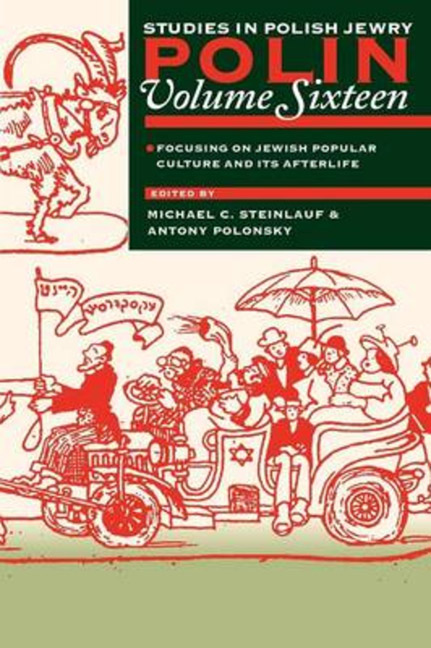Book contents
- Frontmatter
- Dedication
- Editors and Advisers
- Preface
- Polin
- Polin: Studies in Polish Jewry
- Contents
- Note on Place Names
- Note on Transliteration
- PART I JEWISH POPULAR CULTURE IN POLAND AND ITS AFTERLIFE
- IN PRE-WAR POLAND
- AFTERLIFE
- PART II DOCUMENTS
- PART III NEW VIEWS
- PART IV REVIEWS
- REVIEW ESSAYS
- BOOK REVIEWS
- Hillel J. Kieval, Languages of Community: The Jewish Experience in the Czech Lands
- Jacob Goldberg, Haḥevrah hayehudit bemamlekhet polin-lita
- Kristi Groberg and Avraham Greenbaum (eds.), A Missionary for History: Essays in Honor of Simon Dubnow
- Israel Kleiner, From Nationalism to Universalism: Vladimir Zéev Jabotinsky and the Ukrainian Question
- Konrad Zieliński, Żydzi Lubelszczyzny 1914–1918
- Jerzy Malinowski, Malarstwo i rzeźba Żydów polskich w XIX i XX wieku
- Kadya Molodowsky, Paper Bridges: Selected Poems of Kadya Molodowsky, ed. and trans. Kathryn Hellerstein
- Julian Tuwim, Utwory nieznane. Ze zbiorów Tomasza Niewodniczań skiego w Bitburgu: Wiersze, Kabaret, Artykuły, Listy, ed. Tadeusz Januszewski
- Stanisław Wielanek, Szlagiery starej Warszawy: Śpiewnik andrusowski
- Stanisław Wielanek, Party na Nalewkach
- Jan Tomasz Gross, Sa˛siedzi: Historia zagłady z.ydowskiego miasteczka
- Burning Questions: A Film by Mishael Porembski
- Martin Dean, Collaboration during the Holocaust: Crimes of the Local Police in Belorussia and Ukraine, 1941–44
- Jerzy Tomaszewski (ed.), Studia z dziejów i kultury Żydów w Polsce po 1945 roku
- Dagmar C. G. Lorenz (ed.), Contemporary Jewish Writing in Austria: An Anthology
- Romuald Jakub Weksler-Waszkinel, Błogosławiony Bóg Izraela
- CORRESPONDENCE
- OBITUARIES
- Notes on the Contributors
- Glossary
- Index
Burning Questions: A Film by Mishael Porembski
from BOOK REVIEWS
- Frontmatter
- Dedication
- Editors and Advisers
- Preface
- Polin
- Polin: Studies in Polish Jewry
- Contents
- Note on Place Names
- Note on Transliteration
- PART I JEWISH POPULAR CULTURE IN POLAND AND ITS AFTERLIFE
- IN PRE-WAR POLAND
- AFTERLIFE
- PART II DOCUMENTS
- PART III NEW VIEWS
- PART IV REVIEWS
- REVIEW ESSAYS
- BOOK REVIEWS
- Hillel J. Kieval, Languages of Community: The Jewish Experience in the Czech Lands
- Jacob Goldberg, Haḥevrah hayehudit bemamlekhet polin-lita
- Kristi Groberg and Avraham Greenbaum (eds.), A Missionary for History: Essays in Honor of Simon Dubnow
- Israel Kleiner, From Nationalism to Universalism: Vladimir Zéev Jabotinsky and the Ukrainian Question
- Konrad Zieliński, Żydzi Lubelszczyzny 1914–1918
- Jerzy Malinowski, Malarstwo i rzeźba Żydów polskich w XIX i XX wieku
- Kadya Molodowsky, Paper Bridges: Selected Poems of Kadya Molodowsky, ed. and trans. Kathryn Hellerstein
- Julian Tuwim, Utwory nieznane. Ze zbiorów Tomasza Niewodniczań skiego w Bitburgu: Wiersze, Kabaret, Artykuły, Listy, ed. Tadeusz Januszewski
- Stanisław Wielanek, Szlagiery starej Warszawy: Śpiewnik andrusowski
- Stanisław Wielanek, Party na Nalewkach
- Jan Tomasz Gross, Sa˛siedzi: Historia zagłady z.ydowskiego miasteczka
- Burning Questions: A Film by Mishael Porembski
- Martin Dean, Collaboration during the Holocaust: Crimes of the Local Police in Belorussia and Ukraine, 1941–44
- Jerzy Tomaszewski (ed.), Studia z dziejów i kultury Żydów w Polsce po 1945 roku
- Dagmar C. G. Lorenz (ed.), Contemporary Jewish Writing in Austria: An Anthology
- Romuald Jakub Weksler-Waszkinel, Błogosławiony Bóg Izraela
- CORRESPONDENCE
- OBITUARIES
- Notes on the Contributors
- Glossary
- Index
Summary
Nearly six decades have passed since VE Day in May 1945, but personal and family stories continue to tumble out of the Holocaust and the Second World War. Every one is unique and demands our attention. The children of the survivors perhaps best understand the need to tell these stories. Parents and relatives have often resisted revisiting this past, but their children sense that those most dear to them are troubled. They too are troubled that gaps in the family history are not open to discussion, and remain as shadows separating the generations. A daughter's desire to bridge such a gap is the genesis of the film Burning Questions.
Jan Porembski was born in pre-war Poland and lost his father during the Second World War. After the Warsaw uprising he was deported, along with tens of thousands of others, to the Bergen-Belsen concentration camp. He did not return to Poland after the war, but eventually made a career as a network cameraman in America. It was his daughter Mishael who sensed that something was troubling her father and who persuaded him to return with her to Poland. This is the story of a daughter's efforts to understand her father, whom she loves. In the process, a family story is transformed into a meditation on Poland, on Polish–Jewish relations, and on humanity.
Mishael knows the basic outline of her father's story, but asks whether he, as a Polish Catholic, is as much a survivor of the Holocaust as a Polish Jew. Reflecting the popular perception of the Holocaust in America, Mishael asks why her Catholic family had experiences that seem similar to those of the Jews. The return to Warsaw, where Jan's aunt Stefania still lives, provides the occasion for Jan to share with Mishael scenes from his childhood and wartime experiences. For Mishael, the purpose of the trip to Poland is to find her father. However, the journey becomes something larger: an exploration of the ‘Holocaust’ of Polish Catholics, and particularly of the Nazis’ efforts to eliminate the Polish elites and reduce the rest of the population to slave labourers. Jan recounts the story of how the Germans took his father away. It was the last time his father kissed him and said goodbye. ‘I never saw him again’, he says.
- Type
- Chapter
- Information
- Focusing on Jewish Popular Culture and Its Afterlife , pp. 543 - 546Publisher: Liverpool University PressPrint publication year: 2003



